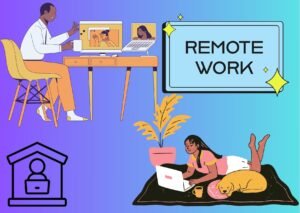
The rise of remote work has brought about significant changes in how we work, communicate, and build relationships in the workplace. While this shift has provided flexibility and convenience, it has also introduced new challenges for workplace culture and employee connection. Let’s explore how remote work is reshaping these aspects of the modern workplace.
1. Increased Flexibility and Productivity
Remote work allows employees to customize their schedules, leading to better work-life balance. Many workers report being more productive without the distractions of an office environment. Flexible working arrangements also enable companies to attract talent from diverse locations, broadening their pool of skills.
However, this flexibility can sometimes blur the lines between personal and professional life, making it essential for employees to set boundaries.
2. Shift in Communication Styles
In an office, communication often happens organically through casual conversations. With remote work, communication is more structured, often relying on tools like video calls, chat apps, and emails.
While technology helps maintain collaboration, it can sometimes lead to communication overload. Employees might feel the pressure to be constantly available, which can lead to burnout. Companies must focus on creating clear communication norms to avoid this.
3. Challenges in Building Workplace Culture
Workplace culture thrives on shared experiences, values, and traditions. In remote settings, fostering this culture becomes more difficult. Team-building activities, casual office interactions, and spontaneous problem-solving moments are harder to replicate online.
To address this, many companies are adopting virtual events, like online happy hours, trivia games, or wellness sessions, to keep employees engaged and connected.
4. Redefining Employee Connection
Without physical proximity, employees may feel isolated or disconnected from their peers. Building meaningful relationships remotely requires intentional effort. Managers play a key role in checking in with team members and creating opportunities for collaboration.
Regular virtual coffee chats or mentorship programs can help employees feel more connected to their colleagues.
5. Hybrid Models: The Best of Both Worlds?
Many organizations are now adopting hybrid work models, combining remote and in-office work. This approach allows employees to enjoy the benefits of flexibility while still fostering in-person collaboration. Hybrid models also give companies the chance to rebuild a sense of community through occasional on-site meetings.
Conclusion
The remote work revolution is transforming workplace culture in profound ways. While challenges like communication gaps and isolation exist, they can be addressed with thoughtful strategies. Companies that prioritize employee well-being and foster a strong sense of connection will thrive in this new era of work.
Post your own content here
